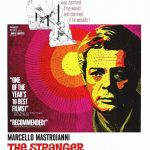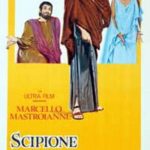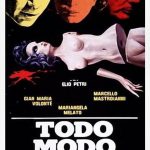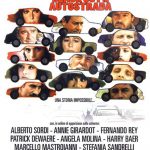-
The 10th Victim (1965)
PKR 250In the near future, big wars are avoided by giving individuals with violent tendencies a chance to kill in the Big Hunt. The Hunt is the most popular form of entertainment in the world and also attracts participants who are looking for fame and fortune. It includes ten rounds for each competitor, five as the hunter and five as the victim.
-
The Stranger (1967)
PKR 250The Stranger is a literal (but still very cinematic) adaptation of the novel by Albert Camus. Marcello Mastrioanni stars as Meursault, a man who feels utterly isolated from everyone and everything around him. This alienation results in sudden, inexplicable bursts of violence, culminating in murder. The subsequent trial of Meursault manages to convey the oppressive heat of its Algerian setting with director Luchino Visconti’s usual veneer of elegant decadence. Though set in the 1930s, the sensibilities of the film were very much attuned to the 1960s: the problem was that Camus’ sentiments had been adopted by so many other filmmakers of the period that The Stranger seemed rather commonplace. The film was originally released in Italy as Lo Staniero.
-
Liza (1972)
PKR 250Liza slowly replaces Melampo, Giorgio’s dog. While she accepts it, Giorgio forces her to wear collars and leashes.
-
One Way or Another (1976)
PKR 250Set during a retreat of Christian Democrat politicians who practice spiritual exercises together, it is an allegory of corrupted power. Disturbing, claustrophobic settings are the background to a series of mysterious crimes.
-
Wifemistress (1977)
PKR 250Since her husband pronounced her frigid on her wedding night, Antonia DeAngelis has been an invalid. When he disappears, she believes him dead: she leaves her bed and takes over his business, traveling to see clients. She discovers her husband’s passions, his political writing, mistresses, and his indifference to the peasants on her family’s land. She improves their lot, begins an affair with a young foreign doctor, and publishes her husband’s writings. All this time, he’s hiding from a murder charge in a house across the square. Amazed, he watches her become his sexual and social equal. After the police drop the murder charge, will he disappear, end his life, or rejoin her on new terms?
-
Bye Bye Monkey (1978)
PKR 250In metahistorical New York city electrotechnician Lafayette deals with a megalomaniac director of a wax museum of ancient Rome, an italian lonely anarchist, a group of feminist actresses – including Angelica who falls in love with him – and a small adopted chimpanzee.
-
Traffic Jam (1979)
PKR 250A large international cast takes part in this comedy in which the stories of numerous individuals whose cars are stalled in a massive Roman traffic jam are told.
-
Towards Evening (1990)
PKR 250Professor Ludovico Bruschi is an elderly Communist whose desire is that of living in an orderly and socially just State. But disorder is just about to break into his life, first of all in the shape of his granddaughter Papere and then in that of Papere’s mother Stella, his son’s companion. The relationship between Oliviero, Bruschi’s son, and Stella has come to an end perhaps because of the extreme youth of the two lovers. Now Professor Bruschi is obliged to come to terms with the gloomy, ignorant, offended Stella whose head is full of false and destructive ideals and who disturbs his way of living out daily life. The professor loses his patience and Stella leaves. He looks for her and finds her in hospital with a broken leg. The two of them begin to grow close and then, without realizing it, they come to love each other immensely. Stella’s leg gets better and she goes off to look for new relationships…
-
Marcello Mastroianni: I Remember (1997)
PKR 150In 1996, Marcello Mastroianni talks about life as an actor. It’s an anecdotal and philosophical memoir, moving from topic to topic, fully conscious of a man “of a certain age” looking back. He tells stories about Fellini and De Sica’s direction, of using irony in performances, of constantly working (an actor tries to find himself in characters). He’s diffident about prizes, celebrates Rome and Paris, salutes Naples and its people. He answers the question, why make bad films; recalls his father and grandfather, carpenters, his mother, deaf in her old age, and his brother, a film editor; he’s modest about his looks. In repose, time’s swift passage holds Mastroianni inward gaze.
-
Federico Fellini’s Autobiography (2000)
PKR 150Federico Fellini was one of the most individual and thought provoking directors who based most of his films upon his own reflections, dreams, life events and fantasies, who did not convey any special message for humanity but regarded cinema simply as entertainment. Is there an answer to everything? Can it possibly be? If yes, then life can no longer be so curious, so dynamic, so creative…
- Home
- Pre-Order
- SALE
- Shop
- Action
- Adventure
- Animation
- Art
- Astrology & Space
- Biography
- Body & Mind
- Bollywood
- Comedy
- Crime
- Dance
- Documentary
- Drama
- Family
- Fantasy
- Fitness
- Food & Drink
- Foreign
- Garden & Home
- History
- Horror
- Kids
- Merchandise
- Movie & Theatre
- Musical
- Music
- Mystery
- Nature & Wildlife
- Religion
- Romance
- Science Fiction
- Soap
- Special Interest
- Sport
- Stand-Up
- Thriller
- Transport
- Travel & Places
- TV Movie
- War
- Western
- World
- Boxsets
- TV Series
- HD
- Top Rated
- Search
- Blog
- My Account











